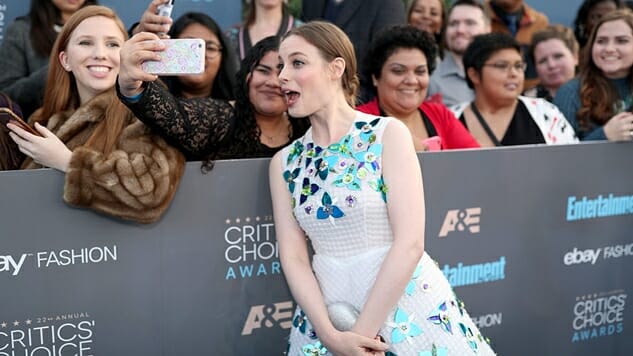Love Star Gillian Jacobs Talks Community, Social Media and Netflix vs. Traditional TV
Photo by Christopher Polk/Getty
When it comes to relationships, Gillian Jacobs is decidedly old-school. With the second season of Love, the Judd Apatow and Paul Rust-helmed glimpse into a modern, flawed relationship, finally arriving on Netflix, Jacobs chatted with Paste about the devotion of Community fans, the evolution of ratings, and why she stays away from dating apps (for herself, anyway).
Paste: Lots of people know you from Community. It broke ground by connecting so strongly with its fanbase via social media and other forward-thinking means, that they were able to essentially keep it alive for several years even without traditional ratings success. While you were on the show, did you personally feel that support?
Jacobs: Oh yeah, I felt it in so many ways…the tweets and messages we would get. I used to screen capture every time something from Community trended on Twitter. I felt like maybe we would have to send them all to NBC at some point to plead our case.
People from around the world became friends through their mutual love of Community. They organized their own fan art show in Los Angeles and there were three fan organizations conventions just for the show, CommuniCon. It was amazing to see people take their fandom from digital spaces into the real world and meet up and form friendships and interact with each other solely based on the shared love for Community.
Paste: How did that fan response compare to what you’ve seen thus far for Love?
Jacobs: Fans of Community from early on felt like they had to fight to save the show, which is not really the dynamic with Love. We were picked up for two seasons before we even started, and we’re about to make our third. It’s a less protective feeling. I don’t feel like fans of the show feel like they have to ensure its continuation as much, but I do see fan art drawings and I see people engaging with the show online; it’s just less of the “we have to ensure its continuance” and more “we enjoy it.”
Paste: When Mickey and Paul argue on Love, which is often, there is usually no clear-cut right or wrong. Every fight is debatable, depending on the characters’ point of views. Is that a big part of the discussion that comes with fan feedback for the show?
Jacobs: Yeah, Paul said that to him, it’s not a “will they, won’t they” show, but a “should they or shouldn’t they” show. There’s a strong case to be made on both sides. That’s what I love about it; there isn’t a clear hero or villain on the show. It’s people with their issues getting in their own way and then learning and then making the same mistake over again, and then trying again. I think that that lends itself to people feeling like they relate to Mickey or to Gus.
Paste:Love feels even more ready-made for binge-watching than other Netflix shows because the episodes bleed so seamlessly into one another. Is it jarring for you to break for a given season, knowing that the next one will likely pick up almost exactly where you left off?
Jacobs: The hardest thing about it was having to go from the end of season one immediately into the beginning of season two because it had been almost a year and everyone’s hair is slightly different. [Laughs] On a purely technical level, that was challenging. I’m used to shooting and then taking a hiatus and coming back, since that’s how TV works, but it’s a funny thing because you finish the season and then it’s months until it comes out. Season two’s about to come out and we’re going to start working on season three simultaneously. You do kind of feel like you’re a year off, since we’ve been done with season two for a long time and people are going to see it next month.
Paste: Looking at the general impact of newer forms of media and discussion on your most well-known projects, do you think that social media activity could someday take its place alongside traditional TV ratings as a significant barometer of a show’s success?
-

-

-

-

-

-

-

-

-

-

-

-

-

-

-

-

-

-

-

-

-

-

-

-

-

-

-

-

-

-

-

-

-

-

-

-

-

-

-

-








































